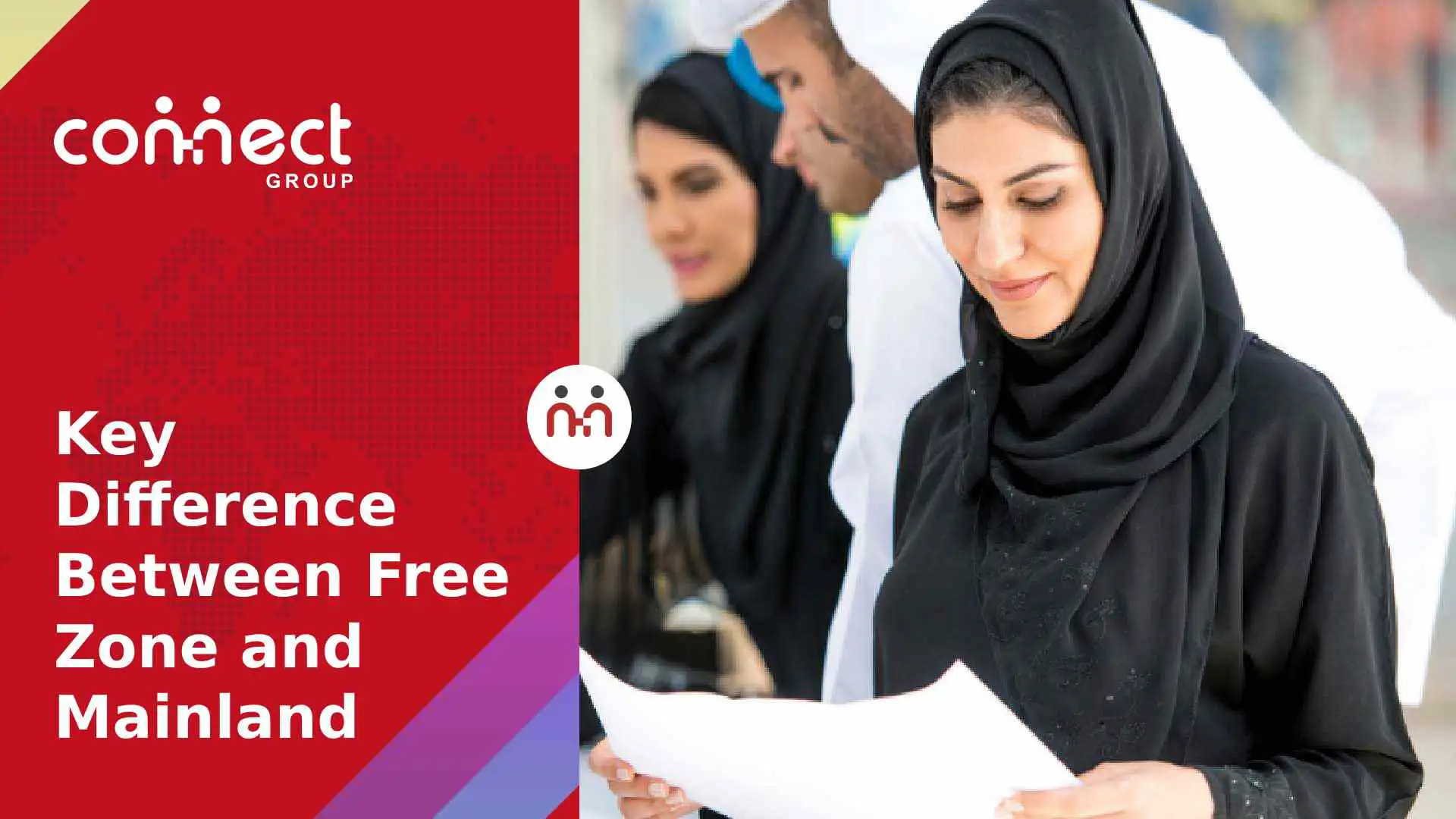When considering business ventures in Dubai, the choice between free zone vs mainland Dubai is pivotal. Dubai’s ever-evolving business landscape offers distinct advantages for entrepreneurs and investors. Also, its strategic location as a global business hub makes it an attractive choice for investors. Then, understanding the nuances of these options is crucial for the success of your business.
In this article, we delve into the fundamental differences between these two options. Additionally, we will shed light on key aspects to aid in your decision-making process. Dubai’s appeal as a business destination is undeniable. However, deciding between UAE free zone or UAE mainland can be a complex process. To make an informed choice, we need to explore the distinctive attributes of Dubai mainland and free zone companies.
UAE Mainland vs. Free Zone Company

When deciding between a free zone vs. mainland Dubai company, it is vital to understand the fundamental distinctions between UAE free zones and UAE mainland. This choice can significantly affect your business’s trajectory. Firstly, to make a good decision, we need to know the concept of each one.
Dubai Mainland Company
In the realm of free zone vs mainland Dubai businesses, understanding the concept of a UAE mainland company is essential. A UAE mainland company, also known as an onshore company, enables entrepreneurs to conduct business across the entire UAE. Unlike free zone companies with specific industry focus, mainland companies have the versatility to engage in various sectors.
When it comes to mainland company formation, it is imperative to note that this process offers a unique proposition in comparison to free zones. Unlike free zones where businesses are subject to industry-specific regulations, mainland companies enjoy the freedom to operate across diverse sectors.
Dubai Free Zone Company
We must check the intricacies of free zone companies to answer the question “What is a free zone?”. A UAE free zone company emerges as a distinct business entity when comparing free zone vs mainland Dubai,. Free zones are designed to cater to specific industries, offering specialized environments for businesses to thrive.
A free zone company enjoys the benefit of 100% foreign ownership, making it an attractive choice for international investors. The setup process within a free zone is known for its simplicity and efficiency.
The difference between freezone and mainland visa is another crucial aspect to consider. Free zone companies often require employees to reside within or near the respective free zone, which can be restrictive compared to the flexibility offered by mainland companies.
Factors of Dubai Mainland
In the free zone vs. mainland Dubai debate, understanding the key factors of mainland companies is vital for making an informed choice. Dubai’s mainland companies offer distinct advantages for businesses seeking a broader customer base.
Factors of Dubai Free Zone
When evaluating the factors of Dubai Free Zone, it is crucial to understand their significance in the free zone vs mainland Dubai business landscape. UAE free zone companies have distinct attributes that set them apart from UAE mainland businesses.
For example, some of these crucial differences are:
Terms | Factors of Dubai Mainland | Factors of Dubai Free Zone |
Authoritative Entities | In the UAE mainland, the Department of Economic Development (DED) holds sway over businesses. When considering how to get Dubai mainland license, it is crucial to recognize the DED's role in ensuring a well-regulated and structured business environment. This authority plays a pivotal role in the setup process, providing comprehensive support and a clear framework for businesses. So, to establish a business in mainland, investors must liaise directly with the DED. This typically involves securing office space, registering a trade name, and ensuring compliance with specific legal requirements. Understanding the complexities of these processes is essential, especially when considering how to invest in mainland company. The DED's regulations, including capital requirements and trade name registration, can vary depending on your chosen business activity. | In Dubai Free Zones, each Free Zone Authority acts as the primary governing body, responsible for overseeing and regulating businesses within their jurisdiction. Examples include the Dubai Multi Commodities Centre (DMCC) and Jebel Ali Free Zone Authority (JAFZA). The presence of various Free Zone Authorities means that each one has its own set of rules, regulations, and requirements. These may vary in terms of business activities, legal structures, and compliance standards. |
Ownership Status | Ownership Status plays a pivotal role in the decision-making process when choosing between Free Zone vs. Mainland Dubai for your business. In the UAE Mainland, foreign investors often require a local sponsor, known as a "Local Service Agent" (LSA). This partnership is a mandatory aspect of mainland company formation and is regulated to safeguard both parties' interests. The LSA, despite holding 51% ownership, plays a passive role in the business, and their involvement is limited to fulfilling legal obligations. This structure ensures that how to invest in mainland company is in accordance with local regulations, creating a win-win scenario for investors. | In the dynamic landscape of business in Dubai, understanding the nuances of ownership status in Free Zones versus Mainland is vital. It plays a pivotal role for entrepreneurs exploring the free zone vs. mainland Dubai options. UAE Free Zone companies stand out with a key feature: 100% foreign ownership. This is a remarkable advantage that positions Free Zones as highly attractive to international investors. So, whether you aspire to establish a business in Free Zone or the Mainland, comprehending the implications of ownership is fundamental in making an informed decision. |
Business Expansion Horizons | When considering free zone vs. mainland Dubai, it becomes evident that UAE mainland companies enjoy the advantage of seamless expansion. In the bustling cosmopolitan hub of Dubai, mainland companies are not confined by territorial limitations. This means that they can conduct business activities not only within the UAE but also globally. This dynamic operational freedom opens the doors to unparalleled opportunities for growth and diversification. | Entrepreneurs exploring free zone vs mainland Dubai often consider Free Zones for their distinct growth potential. UAE Free Zones, including those in Dubai, provide an enticing proposition for businesses aiming to establish a presence in the region. These zones offer favorable conditions for international trade and investment. UAE Free Zones have gained considerable popularity due to their strategic location, offering seamless access to global markets. These zones provide a dynamic environment for businesses of all sizes, such as startups to large corporations. |
Licensing Requirements | In the UAE Mainland, businesses must adhere to specific regulations set by the Department of Economic Development (DED). The licensing process is often more intricate due to the involvement of various government departments. Understanding how to get Dubai mainland license entails thorough documentation and approvals. The specifics vary based on the type of business activity. For instance, a food-related business would require clearance from the Dubai Municipality. | When comparing free zone vs. mainland Dubai for your business venture, understanding the licensing requirements is vital. In UAE Free Zones, the process is renowned for its efficiency and transparency, making it an attractive option for many entrepreneurs. If you want to know how to get Dubai Freezone license, it is relatively straightforward. Firsly, you must choose the specific Free Zone that aligns with your business activity. Also, Free Zone setups often allow for multiple business activities under a single license. Another notable feature is the absence of stringent documentation requirements, which expedites the licensing process. |
Required Funds | This financial aspect plays a pivotal role in making an informed choice between free zone vs mainland Dubai setups. Certainly, the process of mainland company formation typically entails a higher initial investment. The cost of setting up a business in mainland includes expenses such as office space, which is mandatory for most business activities. This requirement implies renting or purchasing suitable premises, which can vary in cost depending on the location and size. Additionally, entrepreneurs must allocate funds for trade licenses, legal fees, and other mandatory approvals. | Required Funds in Dubai Free Zone can be a deciding factor when choosing between free zone vs mainland Dubai. Starting a business in free zone often requires less initial capital compared to establishing a mainland company. This affordability makes free zone companies particularly attractive to startups and small businesses. The cost of setting up in a free zone can vary depending on the chosen free zone and the specific business activity. Each free zone authority in Dubai sets its own fee structure and minimum capital requirements. Furthermore, business in free zone can be advantageous due to the absence of restrictions on fund repatriation. Investors can easily transfer their profits and capital without incurring additional fees or facing cumbersome regulations. |
Tax Criteria | Understanding the taxation framework is pivotal for entrepreneurs exploring free zone vs mainland Dubai options. In the context of Mainland Dubai, companies are subject to the UAE's standard corporate tax rate, which currently stands at 20%. This taxation model applies to a broad range of industries and businesses operating in the mainland. However, it is worth noting that there are specific tax exemptions and incentives in place for certain sectors and activities. This can offer tax relief for businesses involved in strategic industries, further optimizing the mainland company formation decision. | When comparing free zone vs. mainland Dubai, understanding the tax implications is essential. UAE Free Zones are known for their favorable tax structures. One of the primary attractions of setting up a business in Free Zone is the tax benefits it offers. Free Zones typically provide tax exemptions for a specific period, often extending up to 15 years. This is a significant advantage for companies looking to maximize their profits and minimize operational costs. |
Conclusion
In conclusion, the choice between free zone vs mainland Dubai is a pivotal decision for entrepreneurs. Evaluating factors such as ownership, licensing, and taxation is crucial. Free Zone offers 100% foreign ownership, simplified licensing, and tax incentives for a specified period.
Mainland companies entail local sponsorship, more complex licensing, and standard corporate tax rates. Entrepreneurs should align their business goals, budget, and target market with the appropriate setup. Seeking professional advice is invaluable.
Ultimately, understanding the distinctions between Free Zone and Mainland in Dubai is vital to making an informed choice that suits your business objectives.
Frequently Asked Questions
Addressing common queries about free zone vs mainland Dubai business setup is essential to assist entrepreneurs in making informed decisions. For instance, some of the most common questions include:
What is free zone and mainland in UAE?
In the context of free zone vs mainland Dubai, they are two distinct options for setting up businesses in the UAE.
Firstly, free zones are designed for specific industries. Thus, they provide benefits such as 100% foreign ownership and tax exemptions. On the other hand, mainland companies operate across the entire emirate. They offer access to a broader customer base but with different ownership and taxation regulations.
Which is better, mainland or free zone?
Understanding the nuances of free zone vs mainland Dubai is essential for making an informed choice The choice between a mainland and free zone company depends on your business goals and industry.
Free zones are ideal for startups and businesses with limited expansion plans. However, mainland companies provide access to a broader market but come with specific ownership and taxation requirements.
The difference between freezone and mainland visa should also be weighed. Mainland businesses typically provide more flexibility in hiring foreign talent and managing visas for employees, which can be an advantage.
In short, determining whether mainland or free zone is better for your business hinges on a thorough evaluation. Of course, take into account your specific business goals, budget, ownership preferences, and target market. Seeking professional advice and considering the factors discussed will help you make a decision that aligns with your business objectives.

Would you like to know more about this or other topics? Then, visit our insight section.
Read More Here:




